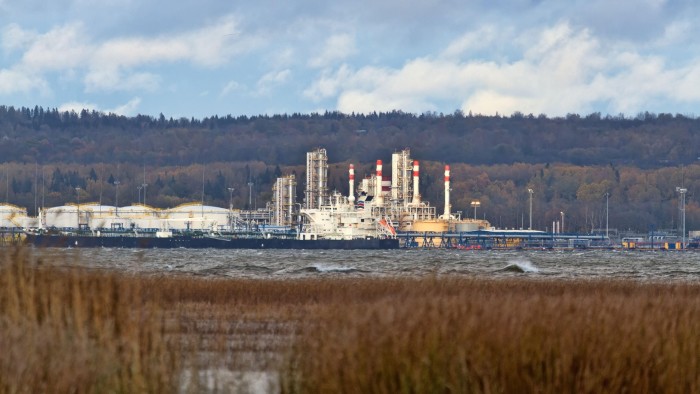Unlock the Editor’s Digest for free
Roula Khalaf, Editor of the FT, selects her favourite stories in this weekly newsletter.
Russian authorities are investigating a sixth suspected explosion this year on a tanker serving a Russian port after an ammonia leak linked to an apparent explosion on a gas tanker at the Baltic port of Ust-Luga on Sunday.
The incident on the Eco Wizard, owned by Greece’s StealthGas, came nine days after a blast on the Greek-owned crude oil tanker Vilamoura in the Mediterranean.
There has been speculation that the explosions are linked to Ukraine, although the Ukrainian authorities have declined to comment and there are rival theories, including links between many of the affected vessels and Libya.
The Vilamoura’s owners revealed in a statement on Sunday that examination of the vessel in port in Piraeus had confirmed the vessel was damaged by an external source, which it described as an “unidentified explosive device”.
All but one of the explosions have affected vessels owned by Greek and Cypriot shipowners not under sanctions. One of the vessels — the Koala, a crude oil tanker damaged in a blast in Ust-Luga in February — was placed under EU sanctions for the improper transportation of Russian oil in May.
A statement published on the Russian transport ministry’s Telegram channel on Sunday said there had been a “minor ammonia leak” on July 6 as a result of an “incident during loading and unloading operations on the tanker Eco Wizard”. The statement said the 23 crew members left the ship safely, that no injuries were reported, and emergency services were working to contain the aftermath.
It also said that an “emergency meeting” was held at the transport ministry, chaired by minister Roman Starovoyt, who was dismissed on Monday by Russian President Vladimir Putin. Kremlin spokesperson Dmitry Peskov said the decree did not mention a loss of confidence as the reason for his dismissal.
There have been reports that the ammonia leak was a result of an explosion, including on several Russian Telegram channels with ties to law enforcement. The cause remains unknown, although one security expert said the damage appeared to be to the vessel’s engine room, suggesting it was not a result of a problem with the cargo.
There was no reply to requests for comment sent on Sunday to StealthGas and to one of its senior executives
While most of the controversy around Russia’s continued oil trade surrounds vessels in the “dark fleet” of vessels with uncertain ownership, this year’s apparent explosions have mostly affected vessels owned by mainstream owners.
StealthGas is listed on the US’s Nasdaq stock exchange.
All of the vessels hit have picked up cargoes from Russian ports, although the public information available shows they collected cargoes not covered by sanctions on Russia, such as oil from Kazakhstan.
Ammonia, the cargo that the Eco Wizard was loading, is not affected by sanctions on Russian oil. The Eco Wizard is the first gas tanker to be hit. The other explosions have all been on crude oil or oil product tankers.
The security expert said the incident was “almost certainly” a result of an attack and suggested a “commando-style raid deep into Russian territory”.
He added that it suggested those responsible were rejecting the idea there could be any legitimate trade with Russia.
The GUR, the Ukrainian military intelligence directorate, which some observers have suggested could be involved, declined to comment. The agency has conducted numerous audacious operations deep inside Russia and Russian-controlled parts of Ukraine throughout the war, including several for which it has claimed credit. But there is no evidence to tie it to these ship explosions.



